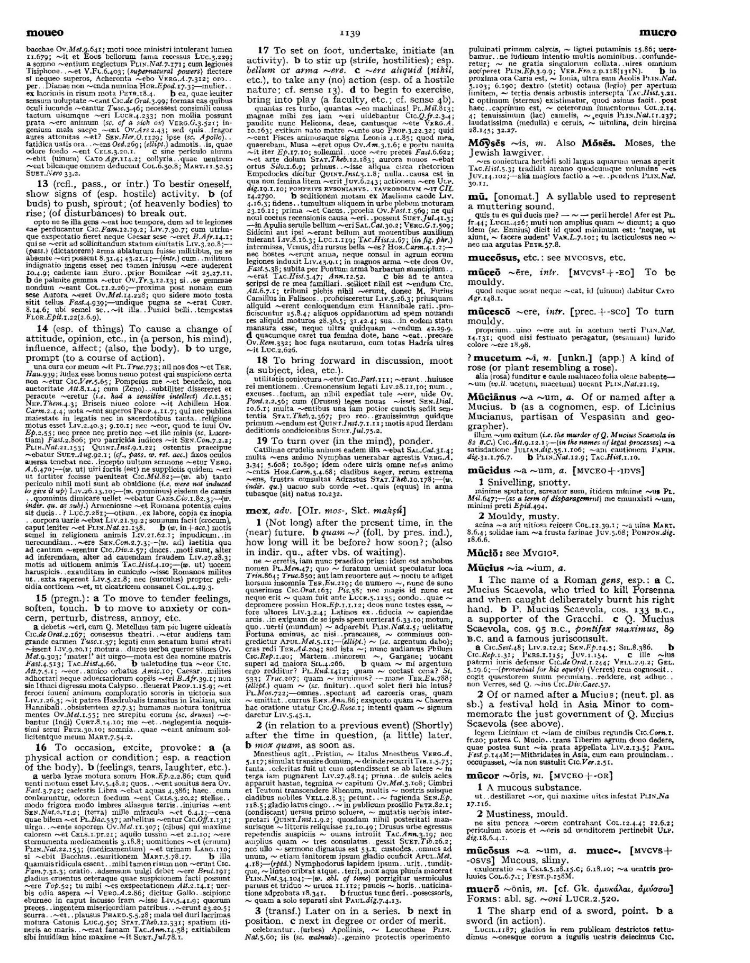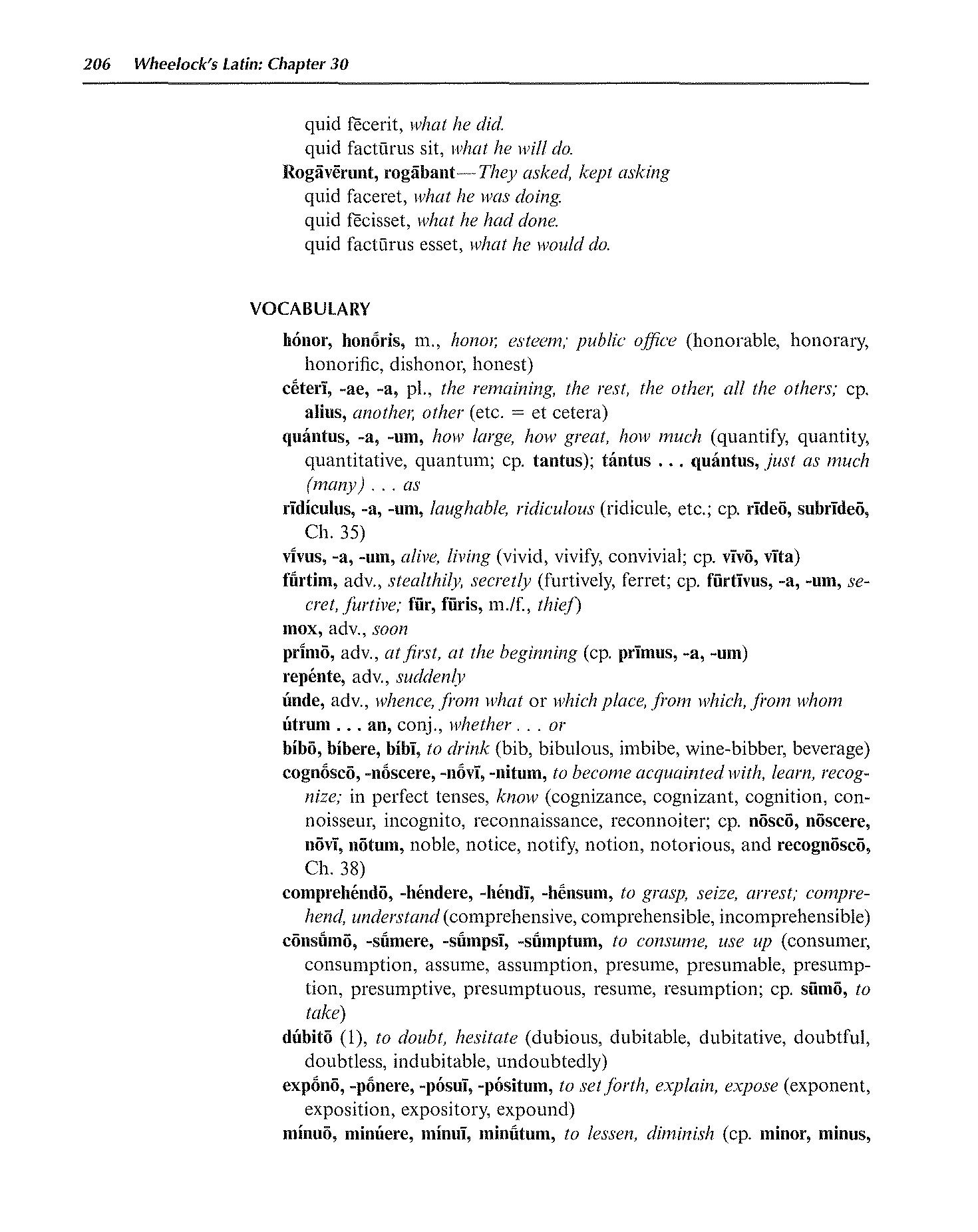
page_listing.tpl
page_subListingDetails.tpl
sub_listingDetails_style1.tpl
sub_listingDetails.title.tpl
mox soon
mox is a Latin Adverb that primarily means soon.
Definitions for mox
Wheelock's Latin
Adverb
- 1
soon
Oxford Latin Dictionary
Adverb
- 1
(Not long) after the present time, in the (near) future. (b) quam ~? (foll. by pres. ind.), how long will it be before? how soon?; (also in indir. qu., after vbs. of waiting).
- 2
(in relation to a previous event) (Shortly) after the time in question, (a little) later. (b) mox quam, as soon as.
Sentences with mox
Latin to English
Hodiē audit (A) eōs venīre (hodiē); (B) eōs venīsse (herī); (c) eōs ventūrōs esse (mox). Compare Today he hears (A) that they are coming (today); (B) that they came (yesterday); (c) that they will come (soon).
Puerī in viās urbis ēgressī mox lūdō appropinquābant.Compare The boys, having gone out into the streets of the city, soon were approaching the school.
Fama, malum qua non aliud velocius ullum: mobilitate viget virisque adquirit eundo, parva metu primo, mox sese attollit in auras ingrediturgue solo et caput inter nubila condit.Compare Rumor, the swiftest traveler of all the ills on earth, thriving on movement, gathering strength as it goes; at the start a small and cowardly thing, it soon puffs itself up, and walking upon the ground, buries its head in the cloud-base.
Os tenerum pueri balbumque poeta figurat, torquet ab obscenis iam nunc sermonibus aurem, mox etiam pectus praeceptis format amicis, asperitatis et invidiae corrector et irae.Compare It is the poet that gives form to the child's utterance while it is still tender and lisping. He gives the ear a bias from the first against coarse ways of speaking. Presently he molds the heart also with kindly teaching. correcting roughness and envy and anger.
Data sources
Notes
- Definitions
- Frederick M. Wheelock, Wheelock's Latin, 6th ed., rev. Richard A. LaFleur (New York, NY: HarperCollins Publishers, 2005): 206.
- P. G. W. Glare, Oxford Latin Dictionary, Vols. 1-8 (Oxford: Clarendon Press, 1982): 1139.
- Word frequencies
- Christopher Francese, "Latin Core Vocabulary," Dickinson College Commentaries, last modified 2014, http://dcc.dickinson.edu.
- Paul B. Diederich, The Frequency of Latin Words and Their Endings, PhD diss., (Columbia University, 1939).
- Louis Delatte, Suzanne Govaerts, Joseph Denooz, and Etienne Evrard, Dictionnaire fréquentiel et index inverse de la langue latine [Frequency Dictionary and Inverse Index of the Latin Language] (Liège, Belgium: Laboratoire d'analyse statistique des langues anciennes de l'Université de Liège [L.A.S.L.A.], 1981): 122.
Bibliography
Allen, Joseph H. Allen and Greenough's New Latin Grammar for Schools and Colleges: Founded on Comparative Grammar. Edited by James B. Greenough, George L. Kittredge, Albert A. Howard, and Benjamin L. D'Ooge. Boston, MA: Ginn & Company, 1903.
Crystal, David. A Dictionary of Linguistics and Phonetics. 6th ed. Oxford, UK: Blackwell Publishing, 2008.
Delatte, Louis, Suzanne Govaerts, Joseph Denooz, and Etienne Evrard. Dictionnaire fréquentiel et index inverse de la langue latine [Frequency Dictionary and Inverse Index of the Latin Language]. Liège, Belgium: Laboratoire d'analyse statistique des langues anciennes de l'Université de Liège (L.A.S.L.A.), 1981.
Diederich, Paul B. The Frequency of Latin Words and Their Endings. PhD diss., Columbia University, 1939.
Francese, Christopher. "Latin Core Vocabulary." Dickinson College Commentaries. Last modified 2014. http://dcc.dickinson.edu/latin-vocabulary-list.
Gildersleeve, Basil L., and Gonzales Lodge. Gildersleeve's Latin Grammar: Third Edition, Revised, and Enlarged. 3rd ed. London, England: Macmillan and Co., 1903.
Glare, Peter G.W. Oxford Latin Dictionary. Vols. 1-8. Oxford, England: Clarendon Press, 1982.
Krüger, Bernd. "Latin Conjugation Tables." Cactus2000. Accessed May 5, 2023. https://latin.cactus2000.de/index.en.php.
Pierson, Nick. "Sound of Text." Accessed October 26, 2019. https://soundoftext.com.
Wheelock, Frederick M. Wheelock's Latin. 6th ed. Revised by Richard A. LaFleur. New York, NY: HarperCollins Publishers, 2005.
Wiktionary Contributors. "Victionarium." Wikimedia Foundation, Inc. Updated March 18, 2019. https://la.wiktionary.org/wiki/Victionarium:Pagina_prima.
Citation
Chicago (17th ed.)
Allo Contributors. "mox (adv.) - Latin Word Definition." Allo Latin Dictionary. Last modified . Accessed February 20, 2026. http://ancientlanguages.org/latin/dictionary/mox.
Entry created on . Last updated on .







